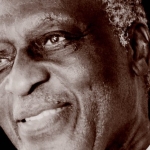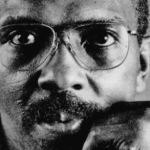I.
Dzogbese Lisa has treated me thus
It has led me among the sharps of the forest
Returning is not possible
And going forward is a great difficulty
The affairs of this world are like the chameleon feces
Into which I have stepped
When I clean it cannot go.1
I am on the world's extreme corner,
I am not sitting in the row with the eminent
But those who are lucky
Sit in the middle and forget
I am on the world's extreme corner
I can only go beyond and forget.
My people, I have been somewhere
If I turn here, the rain beats me
If I turn there the sun burns me
The firewood of this world
Is for only those who can take heart
That is why not all can gather it.
The world is not good for anybody
Alas! The travelers are back
All covered with debt.
II.
Something has happened to me
The things so great that I cannot weep;
I have no sons to fire the gun when I die
And no daughters to wail when I close my mouth
I have wandered on the wilderness
The great wilderness men call life
The rain has beaten me,
And the sharp stumps cut as keen as knives
I shall go beyond and rest.
I have no kin and no brother,
And Kpeti's great household is no more,
Only the broken fence stands;
And those who dared not look in his face
Have come out as men.
How well their pride is with them.
Let those gone before take note
They have treated their offspring badly.
What is the wailing for?
Somebody is dead. Agosu himself
Alas! A snake has bitten me
My right arm is broken,
And the tree on which I lean is fallen.
Agosi if you go tell them,
Tell Nyidevu, Kpeti, and Kove
That they have done us evil;
Tell them their house is falling
And the trees in the fence
Have been eaten by termites;
That the martels curse them.
Ask them why they idle there
While we suffer, and eat sand.
And the crow and the vulture
Hover always above our broken fences
And strangers walk over our portion.




















Comment form: